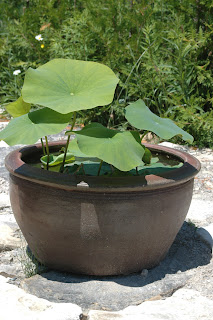After having spent the last six months immersed in cold water, Mrs Perry D. Slocum has risen out to get ready to grace the garden once again with her great charm and beauty.
 |
| Witnesses to Mrs Slocum's Rising |
No, Mrs Slocum is not some kind of watery vampire but, as you might have guessed, a plant. Mrs Perry D. Slocum is an aristocrat of the plant world (not to be confused by people of my generation, with Mrs Slocum of the British television comedy “Are You Being Served”).
She is a lotus, the plant associated with the Buddha. You might not have noticed that in most representations of the Buddha, he sits on a leaf. It is a lotus leaf, the plant being a symbol of the beauty and purity that comes out of muck.
The lotus grows in full sun with its roots in mud. In warmer places, it simply grows in shallow water and comes back every spring. In our climate, left in such a position, it would freeze and die.
In order to survive, the plant must spend the winter in deep enough water not to freeze. However, in spring, this is too deep for its liking, as the plant prefers to be covered with only shallow water. What you can do to accommodate its requirements is to grow it in a pot which you sink in deep water in the fall and bring up into shallow water in the spring.
I grow it in a large plastic pot (sunk in the deep end of the pond all winter) which, in spring, I raise and move into a larger decorative pot whose drainage holes have been plugged. I make sure the water level in the decorative pot always covers the plant base. I must add that the plastic pot has to be round. Apparently in a pot with angles, the growing tip gets stuck in a corner and the plant dies!
This might seem a lot of work for one plant, but this Mrs Slocum is worth all the trouble. On their own, the round leaves on long stems coming out of the water would be worth all the fuss. However the plant also produces magnificent flowers and, once they are over, a seed pod that is a work of art.
As you might also have guessed, Perry D. Slocum was the hybridizer (a cross between the native Nelumbo lutea and Nelumbo Rosea Plena). The name is, no doubt, meant to honour his wife, but one feels she should have insisted that at least her own first name be used.
I can only find a picture of the leaves with no bloom. In you are interested, you can easily find a picture of the bloom on the Net. At the very end is a picture of someone who was hiding under the lotus pot.


No comments:
Post a Comment
Thank you for leaving a comment